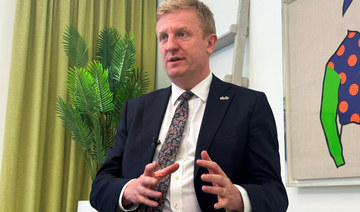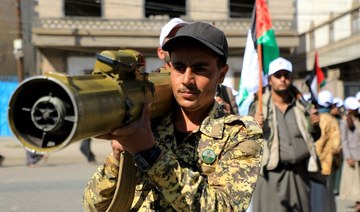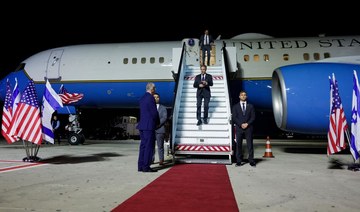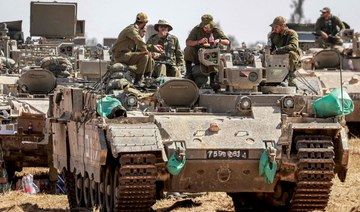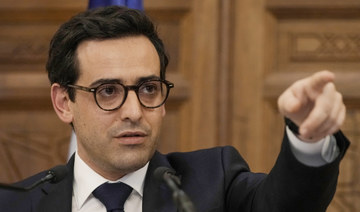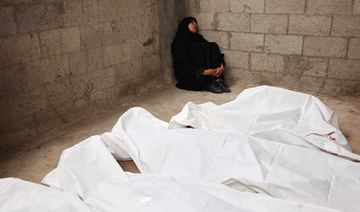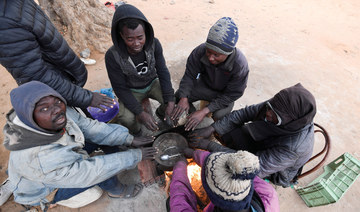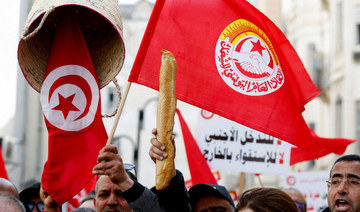WASHINGTON: The United States and Britain launched strikes against 36 Houthi targets in Yemen on Saturday, in the second day of major US operations against Iran-linked groups following a deadly attack on American troops last weekend.
The strikes hit buried weapons storage facilities, missile systems, launchers and other capabilities the Houthis have used to attack Red Sea shipping, the Pentagon said, adding it targeted 13 locations across the country.
It was the latest sign of spreading conflict in the Middle East since war erupted between Israel and Hamas after the militant Palestinian group’s deadly assault on Israel on Oct.7.
“This collective action sends a clear message to the Houthis that they will continue to bear further consequences if they do not end their illegal attacks on international shipping and naval vessels,” US Defense Secretary Lloyd Austin said.
The Yemen strikes are running parallel to an unfolding US campaign of military retaliation over the killing of three American soldiers in a drone strike by Iran-backed militants on an outpost in Jordan.
On Friday, the US carried out the first wave of that retaliation, striking in Iraq and Syria against more than 85 targets linked to Iran’s Islamic Revolutionary Guard Corps (IRGC) and militias it backs, reportedly killing nearly 40 people.
While Washington accuses Iran-backed militias of attacking US troops at bases in Iraq, Syria and Jordan, Yemen’s Iran-linked Houthis have been regularly targeting commercial ships and warships in the Red Sea.
The Houthis, who control the most populous parts of Yemen, say their attacks are in solidarity with Palestinians as Israel strikes Gaza. But the US and its allies characterize them as indiscriminate and a menace to global trade.
Faced with mounting Red Sea violence, major shipping lines have largely abandoned the critical trade route for longer routes around Africa. This has increased costs, feeding worries about global inflation while sapping Egypt of crucial foreign revenue from shippers sailing the Suez Canal to or from the Red Sea.
Biden’s emerging strategy on Yemen aims to weaken the Houthi militants but stops well short of trying to defeat the group or directly attack Iran, the Houthis’ main sponsor, experts say.
The strategy blends limited military strikes and sanctions, and appears aimed at punishing the Houthis while attempting to limit the risk of a broad Middle East conflict.
The US has carried out more than a dozen strikes against Houthi targets in the past several weeks, but these have failed to stop attacks by the group.
Sarea, the Houthi military spokesperson, suggested in a statement on social media that the group’s intervention in the Red Sea would continue.
“These attacks will not deter us from our ethical, religious and humanitarian stance in support of the resilient Palestinian people in the Gaza Strip,” Sarea said.
Just hours before the latest major wave of strikes from the sea and air, the US military’s Central Command issued statements detailing other, more limited strikes in the past day that included hitting six cruise missiles the Houthis were preparing to launch against ships in the Red Sea.
Around 4 a.m. in Yemen (0100 GMT), the US military also struck a Houthi anti-ship cruise missile that was poised to launch.
“This is not an escalation,” said British Defense Minister Grant Shapps. “We have already successfully targeted launchers and storage sites involved in Houthi attacks, and I am confident that our latest strikes have further degraded the Houthis’ capabilities.”
The United States said Sunday’s strikes had support from Australia, Bahrain, Canada, Denmark, the Netherlands and New Zealand. US Central Command said that beyond missile capabilities, the strikes targeted drone storage and operations sites, radars and helicopters.
Despite the strikes against Iran-linked groups, the Pentagon has said it does not want war with Iran and does not believe Tehran wants war either. US Republicans have been ratcheting up pressure on President Joe Biden, a Democrat, to deal a blow to Iran directly.
It was unclear how Tehran would respond to the strikes, which do not directly target Iran but degrade groups it backs.
Iran’s foreign ministry spokesperson Nasser Kanaani said in a statement the attacks in Iraq and Syria represented “another adventurous and strategic mistake by the United States that will result only in increased tension and instability.”
Iraq summoned the US charge d’affaires in Baghdad to deliver a formal protest after strikes in that country.
US, Britain wage strikes against Iran-linked Houthis in Yemen
https://arab.news/2yccv
US, Britain wage strikes against Iran-linked Houthis in Yemen
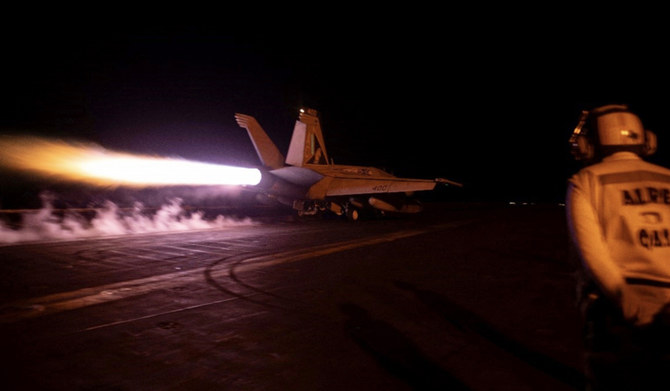
- The United States on Friday carried out strikes in Iraq and Syria against more than 85 targets linked to Iran’s Islamic Revolutionary Guard Corps (IRGC) and militias it backs, reportedly killing nearly 40 people
- The Houthis, who control the most populous parts of Yemen, say their attacks are in solidarity with Palestinians as Israel strikes Gaza
Blinken urges Hamas to agree Gaza truce as he meets Israel leaders
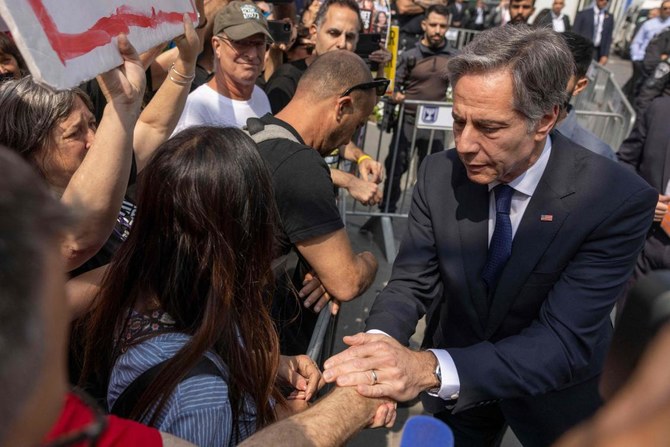
JERUSALEM: Top US diplomat Antony Blinken urged Hamas to accept a truce in the Gaza Strip on Wednesday, after Israeli Prime Minister Benjamin Netanyahu vowed to send troops into its far southern city of Rafah.
Washington has heightened pressure on all sides to reach a ceasefire — a message pushed by Blinken, who was on his seventh regional tour since the Gaza war broke out in October.
An Israeli official told AFP the government “will wait for answers until Wednesday night,” and then “make a decision” whether to send a delegation to indirect talks being brokered by US, Egyptian and Qatari mediators in Cairo.
The Palestinian militant group said it was considering a plan for a 40-day ceasefire and the exchange of scores of hostages for larger numbers of Palestinian prisoners.
Hamas, whose envoys returned from Cairo talks to their base in Qatar, would “discuss the ideas and the proposal,” said a Hamas source, adding: “We are keen to respond as quickly as possible.”
Blinken put the ball squarely in Hamas’s court.
“There is a very strong proposal on the table right now. Hamas needs to say yes, and needs to get this done,” he said.
But analysts questioned whether Hamas would sign up to another temporary ceasefire like the week-long truce that saw more than 100 hostages released in November, knowing that Israeli troops could resume their onslaught as soon as it was over.
“I’m pessimistic about the option of Hamas agreeing to a deal that doesn’t have a permanent ceasefire baked into it,” said Mairav Zonszein, senior analyst on Israel-Palestine at the International Crisis Group.
Zonszein said the three countries brokering the truce talks had their own reasons for trying to bounce the warring parties into a deal.
“The US and Egypt and Qatar all have very strong interests of their own, for various reasons, why they’re trying very hard now to pressure both sides into agreeing to a deal.
“And I think they believe that if they’re able to get an initial deal and a pause, that they can try to build on that,” he said.
Hours before Blinken landed in Tel Aviv, Netanyahu fired a shot across his bows, vowing to send Israeli ground troops into Rafah despite repeated US warnings of the potential for heavy casualties among the 1.5 million civilians sheltering in the city.
“We will enter Rafah and we will eliminate the Hamas battalions there with or without a deal,” the right-wing premier told hostage families, his office said.
Ahead of what promised to be a difficult meeting with Netanyahu in Jerusalem, Blinken too met privately with hostage relatives in Tel Aviv.
In rare scenes for the top US diplomat, who has faced furor at home and abroad over the administration’s support for Israel in its campaign against Hamas, Blinken was greeted outside his Tel Aviv hotel by Israeli demonstrators waving US flags.
Blinken told them that freeing the hostages was “at the heart of everything we’re trying to do.”
The estimates that 129 Israelis remain captive in Gaza, 34 of whom are presumed dead.
Many of their families have expressed hope that US pressure may force Netanyahu to agree a deal for their release.
On the previous leg of his regional tour in Jordan, Blinken said a Gaza truce and the redoubling of aid deliveries went hand in hand.
A truce is “the most effective way to relieve the suffering” of civilians in Gaza, he told reporters near Amman.
Blinken saw off a first Jordanian truck convoy of aid heading to Gaza through the Erez crossing reopened by Israel.
“It is real and important progress, but more still needs to be done,” he said.
UN agencies have warned that without urgent intervention, famine looms in Gaza, particularly in northern areas which are hardest to reach.
A US-built floating pier on Gaza’s coast is expected to be completed later this week, said Cyprus, the departure point for the planned “maritime corridor.”
Blinken said the pier would “significantly increase the assistance” but was not “a substitute” for greater overland access.
In northern Gaza’s Beit Lahia, across from Erez crossing, 24-year-old farmer Yussef Abu Rabih was replanting plots he said had been “completely destroyed” by the fighting.
“We decided to return to farming despite difficult conditions and scarce resources” after suffering “severe hunger,” he told AFP.
The war started after Hamas’s October 7 attack on southern Israel resulted in the deaths of 1,170 people, mostly civilians, according to an AFP tally of Israeli official figures.
Israel’s retaliatory offensive has killed at least 34,568 people in Gaza, mostly women and children, according to the health ministry in the Hamas-run territory.
Washington has strongly backed its ally Israel but also pressured it to refrain from a ground invasion of Rafah, which is packed with displaced civilians.
Calev Ben-Dor, a former analyst for the Israeli foreign ministry and now deputy editor for specialized review Fathom, told AFP that Netanyahu’s “Rafah comments likely have more to do with trying to keep his coalition intact, rather than operational plans in the near term.”
The prime minister “is feeling the squeeze between the Biden administration” and far-right members of his government who have vehemently opposed the proposed truce, Ben-Dor said.
UN chief Antonio Guterres said an Israeli assault on Rafah would “be an unbearable escalation, killing thousands more civilians and forcing hundreds of thousands to flee.”
French foreign minister heads to Cairo as truce talks intensify
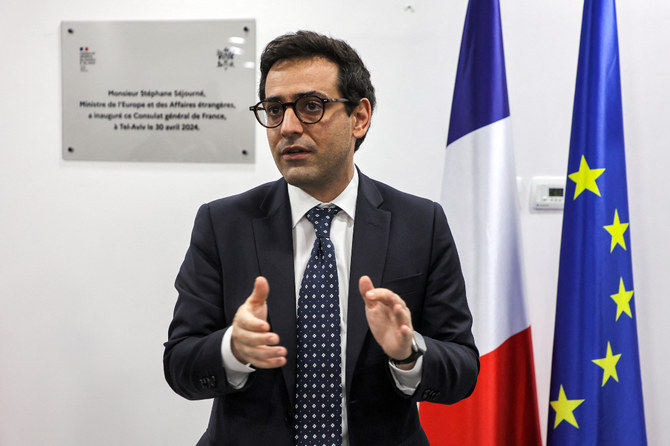
- Diplomatic efforts toward securing a ceasefire were intensifying following a renewed push led by Egypt
- France has three nationals still held hostage by Hamas after the group’s assault on Israel in October
TEL AVIV: France’s foreign minister will travel to Cairo on Wednesday in an unscheduled stop during a Middle East tour as efforts to secure a truce between Israel and Hamas in Gaza reach a critical point, a French diplomatic source said.
Diplomatic efforts toward securing a ceasefire were intensifying following a renewed push led by Egypt to revive stalled negotiations between Israel and Hamas, Gaza’s ruling Palestinian Islamist group.
“The surprise visit of the minister is in the context of Egypt’s efforts to free hostages and achieve a truce in Gaza,” the source said.
France has three nationals still held hostage by Hamas after the group’s assault on Israel in October.
Foreign minister Stephane Sejourne’s trip to Egypt follows stopovers in Lebanon, Saudi Arabia and Israel. He will likely want to assess whether those three hostages could be released and how close a deal actually is.
Sejourne, who saw Israeli Prime Minister Benjamin Netanyahu in Jerusalem on Tuesday, said in an interview on Tuesday that there was some momentum toward an accord, but that it would only be a first step toward a long-term ceasefire.
He warned that an offensive in southern Gaza City of Rafah would do nothing to help Israel in its war with Hamas.
Trucks bringing bodies and detainees into Gaza hold up aid says UNRWA
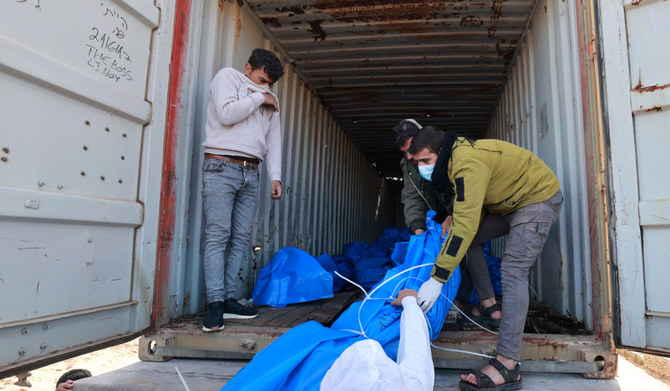
- Israel has killed more than 34,000 Palestinians, according to Gaza’s Health Ministry
- Asked for more details, UNRWA spokesperson Juliette Touma said that Israel had sent 225 bodies to Gaza in three containers since December that were then transported by the UN agency to local health authorities for burial, shutting the crossing temporarily
GENEVA: Trucks bringing both bodies and detainees from Israel back to Gaza through the main crossing point of Kerem Shalom regularly hold up aid deliveries, the head of the UN agency for Palestinian refugees said on Tuesday.
A deepening humanitarian crisis in Gaza has raised pressure on Israel to boost supplies into the enclave to curb disease among the 1.7 million people displaced by the Israeli-Hamas conflict and relieve hunger amid famine warnings from the United Nations.
UNRWA Commissioner-General Philippe Lazzarini told journalists on Tuesday that aid supplies into Gaza had improved in April but listed a series of ongoing difficulties including regular crossing closures “because they (Israel) are dumping released detainees or dumping sometimes bodies taken to Israel and back to the Gaza Strip.”
Asked for more details, UNRWA spokesperson Juliette Touma said that Israel had sent 225 bodies to Gaza in three containers since December that were then transported by the UN agency to local health authorities for burial, shutting the crossing temporarily. She did not have details of the circumstances of their deaths and said it was not UNRWA’s mandate to investigate.
On the detainee transfers, some of which have been previously reported by Reuters, she said that they had been transferred from Israel back to Gaza “dozens of times.”
Israel’s COGAT, a military branch in charge of aid, did not immediately respond to a request for comment. A spokesperson for the Israeli diplomatic mission in Geneva referred questions on the transfers to Jerusalem.
On aid deliveries, he said: “Mr. Lazzarini is deflecting from UNRWA’s own failures and responsibilities. Again today, there was a backlog of more than 150 trucks screened by Israel in Kerem Shalom not picked up by UN agencies.”
Tensions are high between Israel and UNRWA with the former accusing 19 UNRWA staff of involvement in the Oct. 7 Hamas attacks against Israel that killed 1,200 people and prompted the latter’s military campaign in Gaza. Israel’s allegations are being examined by UN investigators although a separate review found Israel has yet to provide evidence for accusations that hundreds of UNRWA staff are members of terrorist groups.
Kerem Shalom is one of just two crossings the UN says is currently open between Gaza and its neighbors Egypt and Israel.
Palestinian authorities have previously said that Israel has returned bodies from the Israeli-Hamas conflict after confirming they were not hostages. They said they were trying to identify them and figure out where they were killed.
Tunisian opposition wants political prisoners freed before taking part in presidential election
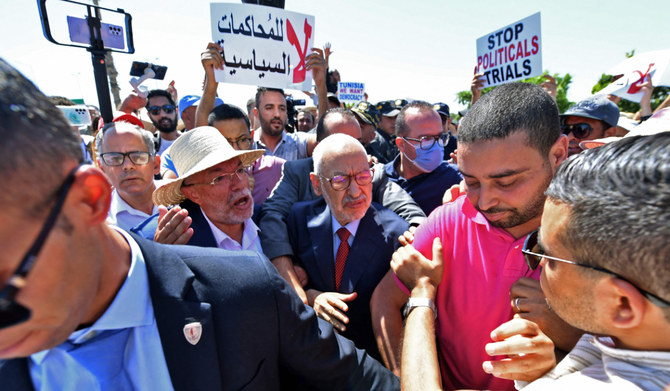
- Ennahdha’s headquarters were shut down a year ago, and its leader Rached Ghannouchi – a former parliament speaker – was sentenced to 15 months in prison on charges of glorifying terrorism
TUNIS, Tunisia: Tunisia’s main opposition coalition said Tuesday it won’t take part in the North African country’s upcoming presidential election unless President Kais Saied’s political opponents are freed and judicial independence is restored.
More than 20 political opponents have been charged or imprisoned since Saied consolidated power in 2021 by suspending parliament and rewriting the country’s constitution. Voters weary of political and economic turmoil approved his constitutional changes in a 2021 referendum with low turnout.
Saied is widely expected to run in the presidential election, likely to take place in September or October. It is unclear if anyone will challenge him.
The National Salvation Front, a coalition of the main opposition parties including once-powerful Islamist movement Ennahdha, expressed concern that the election wouldn’t be fair, and laid out its conditions for presenting a candidate.
They include freeing imprisoned politicians, allowing Ennahdha’s headquarters to reopen, guaranteeing the neutrality and independence of the electoral commission and restoring the independence of the judicial system, according to National Salvation Front president Ahmed Nejib Chebbi.
Ennahdha’s headquarters were shut down a year ago, and its leader Rached Ghannouchi – a former parliament speaker – was sentenced to 15 months in prison on charges of glorifying terrorism. His supporters say the charge is politically driven.
Under the constitutional changes Saied introduced, the president can appoint members of the electoral authority as well as magistrates.
Tunisia’s earlier charter had been seen as a model for democracies in the region.
Tunisia built a widely praised but shaky democracy after unleashing Arab Spring popular uprisings across the region in 2011. Its economic woes have deepened in recent years, and it is now a major jumping off point for migrants from Tunisia and elsewhere in Africa who take dangerous boat journeys toward Europe.
Israeli ground operation in Rafah would be ‘tragedy beyond words’: UN
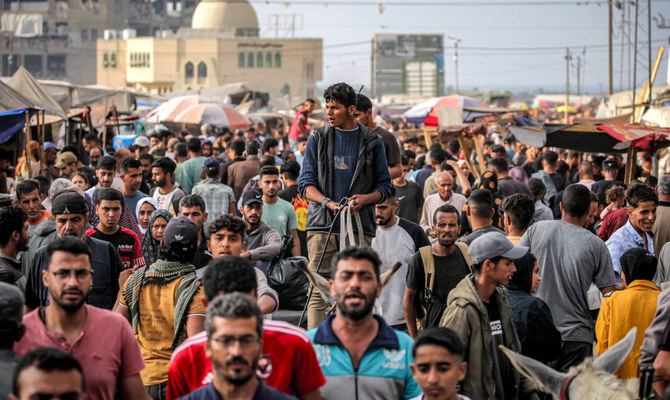
- “The world has been appealing to the Israeli authorities for weeks to spare Rafah, but a ground operation there is on the immediate horizon,” said Griffiths
UNITED NATIONS, United States: A ground operation by Israeli troops in the southern Gaza city of Rafah would be a “tragedy beyond words,” the UN’s humanitarian chief Martin Griffiths said in a statement on Tuesday.
“The simplest truth is that a ground operation in Rafah will be nothing short of a tragedy beyond words. No humanitarian plan can counter that,” Griffiths said, after Israeli Prime Minister Benjamin Netanyahu vowed to launch an offensive on Rafah, which has become a refuge to some 1.5 million Palestinians.
With Hamas weighing a truce plan proposed in Cairo talks with the US, Egyptian and Qatari mediators, Netanyahu vowed to launch the assault on Rafah “with or without a deal.”
Washington has joined calls on Israel from other countries and humanitarian organizations to spare the city for fear an army incursion would lead to massive civilian casualties.
“The world has been appealing to the Israeli authorities for weeks to spare Rafah, but a ground operation there is on the immediate horizon,” said Griffiths.
“For the hundreds of thousands of people who have fled to Gaza’s southernmost point to escape disease, famine, mass graves and direct fighting, a ground invasion would spell even more trauma and death.
“For agencies struggling to provide humanitarian aid despite the active hostilities, impassable roads, unexploded ordnance, fuel shortages, delays at checkpoints, and Israeli restrictions, a ground invasion would strike a disastrous blow.
“We are in a race to stave off hunger and death, and we are losing.”
The war in Gaza started after Hamas’s October 7 attack on southern Israel resulted in the deaths of 1,170 people, mostly civilians, according to an AFP tally of Israeli official figures.
Israel’s retaliatory offensive has killed at least 34,535 people in Gaza, mostly women and children, according to the health ministry in the Hamas-run territory.
Palestinian militants also took some 250 hostages on October 7. Israel estimates 129 remain in Gaza, including 34 believed to be dead.




